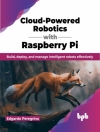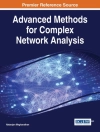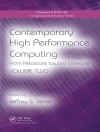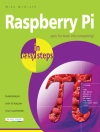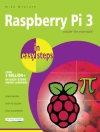This book covers new developments and advances in the field of Computational Strategies for next-generation computing. The contributing authors share diverse perspectives on and extensive discussions of issues concerning the theory, applications, and future prospects. Addressing computing methodologies, hardware information systems and networks, this interdisciplinary book will appeal to all scholars with an interest in computing methodologies, hardware information systems and networks.
Cuprins
Computing methodologies Relevance of Mobile Ad hoc Networks to alleviate the impact of chronic diseases- A case study of health system in Botswana.- Computing methodologies Detection and Analysis of Lung Cancer using Radiomic Approach.- Computing methodologies LSB Steganographic Approaches for Hiding Acoustic Data in Video By Using Chaotic and XORing Technique.- Computing methodologies Machine Learning configurations for enhanced Human Protein Function Prediction accuracy.- Computing methodologies Automatic Human Gender Identification Using Palmprint.- Computing methodologies SEASONALITY AS A PARRONDIAN GAME IN THE SUPERIOR ORBIT.- Computing methodologies Comparative study of Combination of Swarm intelligence and Fuzzy C Means Clustering for Medical Image Segmentation.- Computing methodologies Block Coordinate Descent Based Algorithm for Image Reconstruction in Photoacoustic Tomography.- Computing methodologies Applying Machine Learning Algorithms for news articles categorization Using SVM and k NN with TF-IDF approach.- Computing methodologies Syntactic Analysis of Participial type Complex Sentence in Punjabi Language Sanjeev Kumar Sharma.- Computing methodologies Texture based Real-Time Character Extraction and Recognition in Natural Images.- Computing methodologies Impact of various critical factors on App development based on reviews : An investigation.- Computing methodologies An enhanced algorithm for fingerprint pre-processing and matching.- Hardware Effect of Rain Conditions on FSO Communication System.
Despre autor
Dr. Ashish Kr Luhach received his Ph.D. in Computer Science from Banasthali University, India and post graduation from Latrobe University, Australia. Since February 2018, Dr. Luhach has been working as an Associate Professor and Head of the Department of Computer Science and Engineering. He has more than a decade of teaching and research experience and has also worked with various reputed universities in an administrative capacity. He has published more than 40 research papers in journals and conference proceedings, and serves on the editorial board of various reputed journals.
Prof. Kamarul Bin Ghazali Hawari received his Ph.D. from the University Kebangsaan Malaysia (UKM) and is currently serving as a Professor and Dean of the Faculty of Electrical and Electronics Engineering, University Malaysia Pahang, Malaysia. With more than 100 research publications in reputed journals and conference proceedings to his credit, Prof. Hawari’s main research interests are in Machine Vision Systems, Image Processing, Signal Processing, Intelligent Systems, Vision Control, Computer Control Systems, Thermal Imaging Analysis and Computer Engineering.
Dr. Hawari is also a member of the Board of Engineers Malaysia, Senior Member of the IEEE (SMIEEE), and Member of the IEEE Communications Society Chapter. He has edited many reputed books and received several research grants.
Dr. Ioan Cosmin Mihai is a prominent researcher in the field of cyber security, and is currently serving as an Associate Professor at the Faculty of Electronics, Telecommunications and Information Technology, University Politehnica of Bucharest, Romania and at the “Alexandru Ioan Cuza” Police Academy, Romania. Dr. Mihai is the Editor-in-Chief of various international journals, e.g. the International Journal of Information Security and Cyber Crime. The Vice-president of the Romanian Association for Information Security Assurance, Dr. Mihai has authored several books in the fields of cyber security and e-learning.
Prof. Pao-Ann Hsiung received his Ph.D. from National Taiwan University, Taipei, Taiwan, where he is currently a Professor and Dean of International Affairs. Dr. Hsiung has published more than 260 papers in top international Journals and conference proceedings, and received the 2001 ACM Taipei Chapter Kuo-Ting Li Young Researcher award for significant contributions to the Design Automation of Electronic Systems.
Dr. Hsiung is an IET Fellow and senior member of the IEEE, IEEE Computer Society and ACM. His research interests include: Smart Grids, Smart Traffic, Driver Fatigue Prediction, Landslide Prediction, Cyber-Physical System Design, Reconfigurable Computing and System Design, and System-on-Chip (So C) Design and Verification.
Prof. Ravi Bhushan Mishra is asenior Professor at the Indian Institute of Technology (BHU), India. With more than 40 years of teaching and research experience, and more than 250 publications in reputed international journals and conference proceedings, Prof. Mishra’s areas of interest include Artificial Intelligence, Multi-Agent Systems, the Semantic Web and Robotics.




